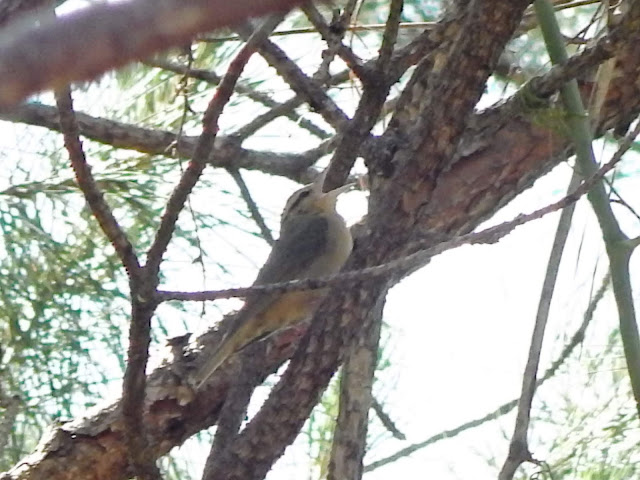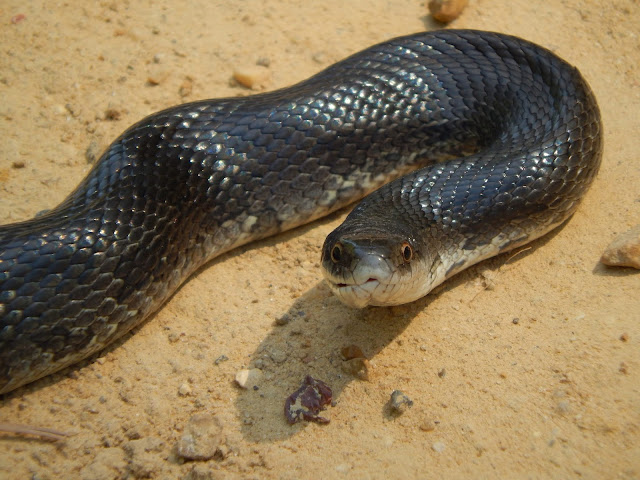 |
| Snyder Road north of Trout Creek bridge -- 4/6/18 |
Other related posts:
-Same Location:http://falloutbird2014.blogspot.com/2018/03/snyder-road-la-salle-parish-3252018.html
& http://falloutbird2014.blogspot.com/2016/05/trout-creek-area-la-salle-parish-may-20.html
-Nearby Locations:http://falloutbird2014.blogspot.com/2018/03/zimmer-creek-road-fall-and-winter-2017.html
& http://falloutbird2014.blogspot.com/2017/08/zimmer-creek-road-la-salle-parish-2017.html
-'Spring, 2018' Posts:http://falloutbird2014.blogspot.com/2018/05/nature-at-jenas-vision-trail-march.html
& https://falloutbird2014.blogspot.com/2018/06/catahoula-nwr-la-salle-catahoula.html
**************************************************
Snyder Road is one of my favorite La Salle Parish locations to bird for upland/woodland species, especially neotropical warblers during the spring and summer. This blog post covers six visits to this location during spring, 2018. My typical way of running this route is to bird driving, with numerous stops and stand-around periods (stay on road -- the woods are posted), starting at the south end of Snyder at LA-8 and ending at the north end at LA-500, and including Choctaw Cemetery Road (a less-than-half-mile dead-end side road off the southern part of Snyder) in the route. This makes the total route just over 4 miles. Exceptions during this spring were ending after Choctaw C. Rd on April 6, and traveling the full route from north to south rather than the other way around on May 15.
If anyone is considering birding (etc.) along this route, please keep a couple of things in mind. The roads can become quite muddy (too muddy) after rains, so give it a few days to dry out first. Secondly, please don't walk off onto posted/private land. Unfortunately, none of the woods along the road are accessible to the public.
Before we go further and list the birds, etc., here are some shots from along the route to illustrate what habitats are present. Pictures are basically in the order of south to north.
 |
| The woods along the southern stretch of the road are beautiful, and pack in a variety of birds and other creatures -- 4/6 |
 |
| 4/18 |
 |
| the spring south of Trout Creek - Louisiana Waterthrush was heard or seen here on multiple dates, and down the road at Trout Creek -- 3/25 |
 |
| Trout Creek bridge - Trout Creek is on the list of Louisiana Natural and Scenic Rivers (and deservedly so!), but there's no real public access to the stream anywhere along it's length. -- 3/25 |
 |
| Trout Creek bridge - 3/25 -- The stretch of road from here through the next six pics had a nice density of Chuck-will's-widows on my nocturnal visit on 5/12. |
 |
| 4/6 |
 |
| As of 5/12, there's been a ' land for sale' sign along this section of road. I wonder what the future of these woods will be. -- 5/15 |
 |
| 5/11 |
 |
| 5/11 |
 |
| Now we're in Prairie Warbler and Yellow-breasted Chat country. -- 4/18 |
 |
| 4/18 |
 |
| 5/11 |
 |
| small creek north of Placid Cutoff - Beyond here, and up to LA-500, there are a few houses, so the real birding opportunities end about here. 4/18 |
A description of each date's visit is listed below, followed by the combined bird list for those visits -- numbers of each species are given for each visit, in chronological order following the name of the bird.
Following the bird content, there's lists and photos of some of the Mammals, Herps, Butterflies, and Wildflowers detected during these visits.
March 25; April 6, 18; and May 11, 12, 15
3/25: 7:25 am, 2 hrs and 46 min; 4.1 miles; 68 - 73 degrees F., cloudy, calm to light breeze; FOS: Red-eyed Vireo and Hooded Warbler. This visit got its own blog entry: .
4/6: 8:50 am, 1 hr and 14 min; 1.2 miles; 60's F., cloudy, light breeze
4/18: 8:20 am, 3 hr and 8 min; 4 miles; 68 - 72 degrees F., cloudy and partly cloudy, moderately windy
5/11: 8:42 am, 2 hr and 49 min; 4.2 miles; 78 - ~85 degrees F., clear/sunny, wind varying from near calm to ~12-15 mph.
5/12: Nocturnal search for Chuck-will's-widows. 8:17 pm, 1 hr and 2 min; 4.2 miles; 77 to 74 degrees F., clear or nearly clear, calm. 16 Chucks: 15 Chucks were heard and at least one was seen. An Eastern Screech-Owl was also seen. The little owl was seen clearly in the truck's headlights as it swooped down across the road to grab some small prey item (likely a frog -- there was a loud chorus of Green Treefrogs in the nearby ponds) from the water that runs down the side of the road by the pond. The owl was on the ground for a few seconds before flying back to the trees, but alas not long enough for me to get a photo or video. It appeared to be a gray color morph.
 |
| the spot where the screech-owl was seen |
Birds not detected on this visit get a 'N' rather than a 0 in the numbers column, to denote nocturnal visit -- most species wouldn't be expected to be seen or heard at during that time.
5/15: Two observers. 11:06 am, 2 hrs and 12 min; 4.2 miles; 80's - ~90 degrees F., not much wind, sky variable between sunny and cloudy, brief very light drizzle toward end of birding. Decided on the spur of the moment to do Snyder Rd after finishing nearby Zimmer Creek Road. Drove Snyder route from north to south, rather than usual south to north. Tracks of a Wild Turkey seen.
 |
| Wild Turkey tracks - 5/15 |
 |
| Wild Turkey track - 5/15 |
Birds:
Great Blue Heron - 1, 1, 0, 0, N, 0
Black Vulture - 0, 3, 0, 0, N, 0
Turkey Vulture - 2, 1, 0, 2, N, 4
Northern Harrier - 0, 0, 1, 0, N, 0
Mississippi Kite - 0, 0, 0, 1, N, 0
Broad-winged Hawk - 0, 0, 1, 0, N, 0
Red-shouldered Hawk - 0, 2, 2, 0, N, 1
Mourning Dove - 4, 0, 2, 0, N, 1
Yellow-billed Cuckoo - 0, 0, 0, 1, 1, 0
Eastern Screech-Owl - 0, 0, 0, 0, 1, 0
Barred Owl - 1, 0, 0, 0, 0, 0
Chuck-will's-widow - 0, 0, 0, 0, 16, 0
 |
| Yikes! (I tried) -- Chuck-will's-widow in road, 5/12 |
Ruby-throated Hummingbird - 0, 0, 2, 1, N, 2
Red-headed Woodpecker - 0, 0, 0, 0, N, 1
Red-bellied Woodpecker - 4, 2, 1, 2, N, 1
Downy Woodpecker - 1, 0, 0, 2, N, 2
Northern Flicker - 4, 0, 3, 0, N, 0
Pileated Woodpecker - 2, 0, 2, 1, N, 1
Acadian Flycatcher - 0, 0, 0, 1, N, 2
Great Crested Flycatcher - 0, 1, 0, 3, N, 2
White-eyed Vireo - 14, 3, 12,15, N, 16
Yellow-throated Vireo - 0, 0, 0, 1, N, 0
Red-eyed Vireo - 3, 5, 3, 6, N, 7
Blue Jay - 13, 6, 9, 4, N, 2
American Crow - 9, 3, 2, 1, N, 1
Purple Martin - 0, 1, 0, 1, N, 0
swallow sp. - 0, 0, 2, 0, N, 0
Carolina Chickadee - 11, 2, 2, 2, N, 0
Tufted Titmouse - 5, 1, 0, 6, N, 4
Brown-headed Nuthatch - 1, 0, 0, 0, N, 0
Carolina Wren - 10, 5, 5, 9, N, 4
Blue-gray Gnatcatcher - 13, 3, 6, 3, N, 4
Ruby-crowned Kinglet - 12, 3, 3, 0, N, 0
Eastern Bluebird - 1, 0, 0, 0, N, 0
Wood Thrush - 0, 0, 0, 2, N, 1
Brown Thrasher - 2, 0, 0, 0, N, 0
Northern Mockingbird - 0, 0, 3, 0, N, 0
Cedar Waxwing - 0, 3, 0, 0, N, 0
Worm-eating Warbler - 1*, 0, 3, 2, N, 4
 |
| Worm-eating Warbler singing -- 4/18/18 |
(video: song of Worm-eating Warbler -- 5/15/18, )
Louisiana Waterthrush - 3, 2, 1, 0, N, 1
(video: song of Louisiana Waterthrush - 4/18/18, 5/15/18)
 |
| Louisiana Waterthrush just after bathing in Trout Creek -- 5/15/18 |
Orange-crowned Warbler - 1, 0, 0, 0, N, 0
Swainson's Warbler - 0, 0, 7, 5, N, 6
 |
| Swainson's Warbler -- 5/15/18 |
Kentucky Warbler - 0, 0, 5, 2, N, 1
(videos: song of Kentucky Warbler - 4/18/18)
 |
| Kentucky Warbler (the one heard in the videos) -- 4/18/18 |
Hooded Warbler - 17,10, 21,18,N, 10
Northern Parula - 1, 1, 0, 0, N, 0
Pine Warbler - 12, 5, 11, 6, N, 6
Yellow-rumped Warbler - 6, 2, 5, 0, N, 0
Prairie Warbler - 0, 0, 9, 3, N, 4
(video: a singing male Prairie Warbler - 4/18/18)
 |
| Prairie Warbler (same individual in video above and pic below) -- 4/18/18 |
 |
| singing Prairie Warbler -- 4/18/18 |
White-throated Sparrow - 2, 0, 2, 0, N, 0
Eastern Towhee - 3, 0, 5, 1, N, 3
Yellow-breasted Chat - 0, 0, 8, 6, 1, 5
Summer Tanager - 0, 0, 3, 4, N, 3
Northern Cardinal - 26, 6, 17, 20,N, 7
Blue Grosbeak - 0, 0, 1, 1, N, 1
Indigo Bunting - 0, 0, 2, 6, N, 4
Orchard Oriole - 0, 0, 2, 0, N, 0
Brown-headed Cowbird - 3, 1, 2, 2, N, 1
American Goldfinch - 1, 0, 0, 0, N, 0
A few notes before moving on...
The "*1" for the Worm-eating Warbler on March 25 is there because, although I'm pretty confident that what I was hearing was a W-E Warbler, this date was a bit early and so I shouldn't rule out a Pine Warbler that was sounding an awful lot like a W-E. One can't be too careful, even with familiar bird vocalizations.
Speaking of bird song that sounds like this... The Chipping Sparrow was heard singing on a couple of dates (as well as during the breeding season in previous years) at the rather 'park-like' oil company facility across from Placid Cutoff, along the northern stretch of Snyder Road.
Mammals:
Eastern Fox Squirrel, Eastern Cottontail; plus tracks of Nine-banded Armadillo, White-tailed Deer, Northern Raccoon.
Herps: Fowler's Toad, Green Treefrog, Cope's Gray Treefrog, Green (Bronze) Frog; Six-lined Racerunner, Little Brown Skink, Prairie Kingsnake (Lampropeltis calligaster)...
 |
| tentative i.d.: Prairie Kingsnake - 5/11 |
 |
| tentative i.d.: Prairie Kingsnake - 5/11 |
 |
| tentative i.d.: Western Ratsnake - 5/11 |
 |
| tentative i.d.: Western Ratsnake - 5/11 |
Leps:
duskywing sp., Spicebush Swallowtail, Spring Azure (April 6)...
 |
| (Spring) Azure (Celastrina "ladon") - 4/6, at same spot (where road crosses spring gully south of Trout Creek) as the "Summer Azures" pictured below |
 |
| (Summer) Azure (Celestrina neglecta) - 5/15 |
 |
| (Summer) Azure (Celestrina neglecta) - 5/15 |
 |
| (Summer?) Azure (Celestrina neglecta) - 5/15 |
...'Astyanx' Red-spotted Purple, lady sp., Carolina Satyr; Large Lace-border (moth), un-i.d.ed moths
Wildflowers:
Violets (Viola spp.)...
Red Buckeye (Aesculus pavia)...
hawthorn spp. (Crataegus)...
 |
| hawthorn - 3/25 |
 |
| Snowbells - 3/25 |
 |
| Coral Honeysuckle - 5/15 |
Lobelia sp....
 |
| Lobelia sp. - 5/11 |
Yucca sp....
yellow Aster sp....
Scutellaria sp....
 |
| Scutellaria sp. - 5/11 |
 |
| Scutellaria sp. - 5/11 |
 |
| White-flowered or Redring Milkweed - 5/11 -- Note the purple ("red") ring around each flower that gives it one of it's common names. |
Catalpa...
 |
| Catalpa - 5/15 |
**Please feel free to let me know in the comments if you spot any incorrect i.d.s, etc.**
Happy Birding (etc.)!
******************************************************************








No comments:
Post a Comment